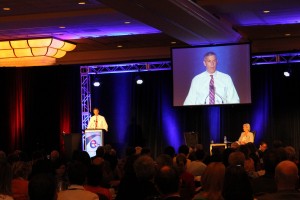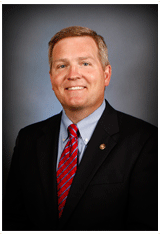ST. LOUIS — The National Forum on Education Policy wrapped up its final day Thursday with keynote speakers Arne Duncan, U.S. Secretary of Education, and Kathleen Sebelius, U.S. Secretary of Health and Human Services.
The topic of both speeches was President Barack Obama’s proposal for expanding early learning, or early childhood education, nationwide through the Preschool for All program.

“Unlike what you might have heard, this is not some entitlement program,” Duncan said to the hundreds of teachers, commissioners and legislators gathered in the Renaissance Hotel ballroom.
“The vast majority of kids who aren’t getting in [early learning programs] are starting school a year to 14 months behind,” Duncan said to reporters after his speech. “That’s the reality, and that, to me, is unsettling.”
The Preschool for All option for states would provide federal dollars to give children of low and moderate-income households the opportunity to participate in early learning programs.
The Department of Education announced earlier this month that Missouri would get $48.3 million if it chose to participate in the program, which would serve just less than 6,000 students during the first year. To receive federal funding, state’s must match 10 percent of the funds that they would receive, meaning Missouri would have to contribute $4.83 million.
Duncan said during his speech that he could understand why states would be reluctant with Congress’ inaction, but stressed that high quality early learning needed to become a priority for all states. He mentioned a bipartisan coalition behind the program of CEOs, military personnel and governors who are investing money in the effort.
“Twenty seven governors talked about early learning in their state of the state addresses,” Duncan said, listing Republican governors from Alabama and Michigan as two who already have taken action — with the legislature — to expand. The waiting list in many states for young children to be involved in some form of an early learning program, Duncan said, is in the thousands.
When Duncan spoke with reporters after the speech, he was asked what his thoughts were on a conservative state like Missouri which is set on refusing federal Medicaid dollars working with a program like Preschool for All. Ultimately, he said it’s the state’s decision. Duncan said he’s agnostic about whether the current set up of matching funds between states and the federal government is the right mix, but said the program isn’t set in stone and they’re open to any ideas the states have.
Duncan said there would be no competition between states for the funds, but rather that there’s “significant money” for every state.
“Frankly, if Missouri doesn’t participate, that’s more money for other states,” Duncan said.

Missouri State Sen. David Pearce, R-Johnson County, the Senate Higher Education Committee Chairman, was one of three current Missouri legislators at the forum, joined by Reps. Steve Cookson, R-Poplar Bluff, the current House Elementary and Secondary Education Committee Chairman, and Mike Thomson, R-Maryville, the House Higher Education Committee Chairman.
Pearce said the speeches and the event confirmed what he already knew about the importance of early learning education, calling it one of the best investments that can be made — a sentiment shared by Duncan and Sebelius. As far as Preschool for All, Pearce said the program was more new to him, but that he’s interested in learning more about it.
“I know it requires a 10 percent match by states to get the federal money,” Pearce said. “A 10-to-one return sounds pretty good.”
Sebelius, who spoke after Duncan during the forum, said starting the education process at age five is “already condemning our children to failure.”
Ashley Jost is no longer with The Missouri Times. She worked as the executive editor for several months, and a reporter before that.




